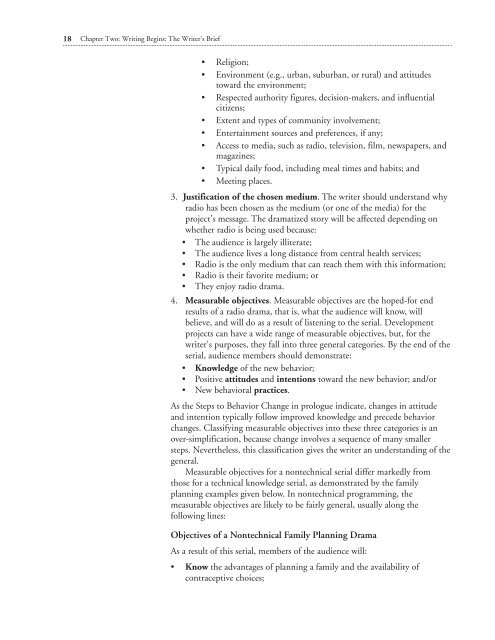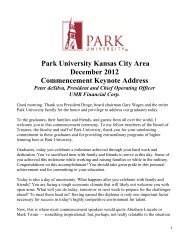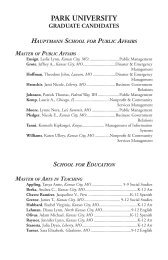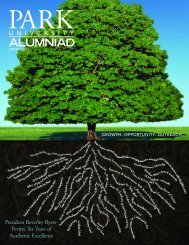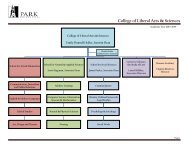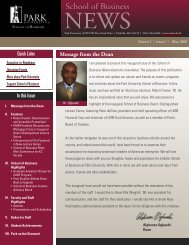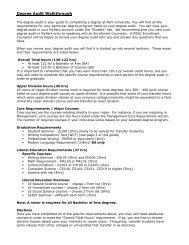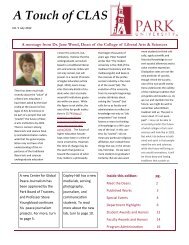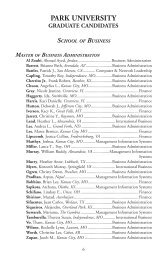How to Write a Radio Serial Drama for Social Development- PDF
How to Write a Radio Serial Drama for Social Development- PDF
How to Write a Radio Serial Drama for Social Development- PDF
Create successful ePaper yourself
Turn your PDF publications into a flip-book with our unique Google optimized e-Paper software.
18 Chapter Two: Writing Begins: The <strong>Write</strong>r’s Brief<br />
• Religion;<br />
• Environment (e.g., urban, suburban, or rural) and attitudes<br />
<strong>to</strong>ward the environment;<br />
• Respected authority figures, decision-makers, and influential<br />
citizens;<br />
• Extent and types of community involvement;<br />
• Entertainment sources and preferences, if any;<br />
• Access <strong>to</strong> media, such as radio, television, film, newspapers, and<br />
magazines;<br />
• Typical daily food, including meal times and habits; and<br />
• Meeting places.<br />
3. Justification of the chosen medium. The writer should understand why<br />
radio has been chosen as the medium (or one of the media) <strong>for</strong> the<br />
project's message. The dramatized s<strong>to</strong>ry will be affected depending on<br />
whether radio is being used because:<br />
• The audience is largely illiterate;<br />
• The audience lives a long distance from central health services;<br />
• <strong>Radio</strong> is the only medium that can reach them with this in<strong>for</strong>mation;<br />
• <strong>Radio</strong> is their favorite medium; or<br />
• They enjoy radio drama.<br />
4. Measurable objectives. Measurable objectives are the hoped-<strong>for</strong> end<br />
results of a radio drama, that is, what the audience will know, will<br />
believe, and will do as a result of listening <strong>to</strong> the serial. <strong>Development</strong><br />
projects can have a wide range of measurable objectives, but, <strong>for</strong> the<br />
writer's purposes, they fall in<strong>to</strong> three general categories. By the end of the<br />
serial, audience members should demonstrate:<br />
• Knowledge of the new behavior;<br />
• Positive attitudes and intentions <strong>to</strong>ward the new behavior; and/or<br />
• New behavioral practices.<br />
As the Steps <strong>to</strong> Behavior Change in prologue indicate, changes in attitude<br />
and intention typically follow improved knowledge and precede behavior<br />
changes. Classifying measurable objectives in<strong>to</strong> these three categories is an<br />
over-simplification, because change involves a sequence of many smaller<br />
steps. Nevertheless, this classification gives the writer an understanding of the<br />
general.<br />
Measurable objectives <strong>for</strong> a nontechnical serial differ markedly from<br />
those <strong>for</strong> a technical knowledge serial, as demonstrated by the family<br />
planning examples given below. In nontechnical programming, the<br />
measurable objectives are likely <strong>to</strong> be fairly general, usually along the<br />
following lines:<br />
Objectives of a Nontechnical Family Planning <strong>Drama</strong><br />
As a result of this serial, members of the audience will:<br />
• Know the advantages of planning a family and the availability of<br />
contraceptive choices;


